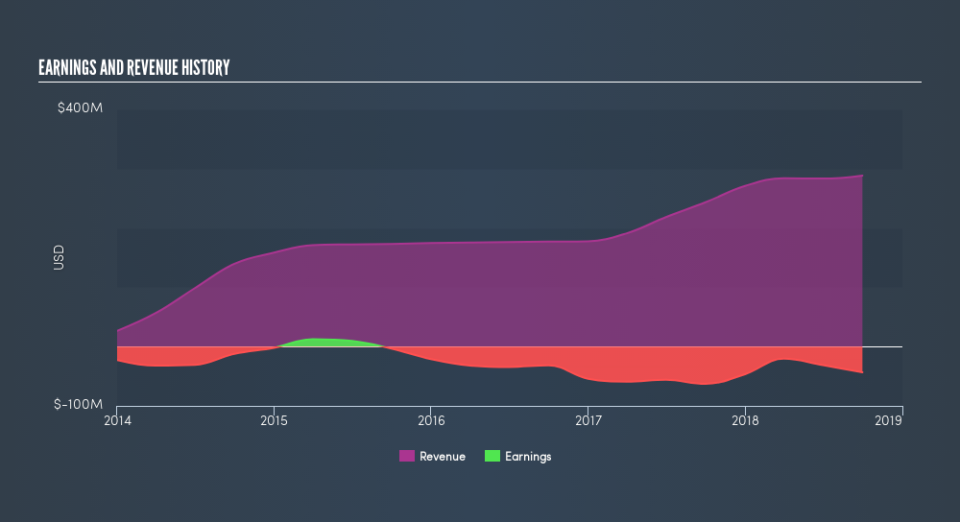What Kind Of Investor Owns Most Of American Finance Trust, Inc. (NASDAQ:AFIN)?

Want to participate in a short research study? Help shape the future of investing tools and receive a $20 prize!
A look at the shareholders of American Finance Trust, Inc. (NASDAQ:AFIN) can tell us which group is most powerful. Insiders often own a large chunk of younger, smaller, companies while huge companies tend to have institutions as shareholders. We also tend to see lower insider ownership in companies that were previously publicly owned.
With a market capitalization of US$1.2b, American Finance Trust is a decent size, so it is probably on the radar of institutional investors. Taking a look at our data on the ownership groups (below), it’s seems that institutions own shares in the company. Let’s delve deeper into each type of owner, to discover more about AFIN.
View our latest analysis for American Finance Trust
What Does The Institutional Ownership Tell Us About American Finance Trust?
Institutions typically measure themselves against a benchmark when reporting to their own investors, so they often become more enthusiastic about a stock once it’s included in a major index. We would expect most companies to have some institutions on the register, especially if they are growing.
We can see that American Finance Trust does have institutional investors; and they hold 15% of the stock. This can indicate that the company has a certain degree of credibility in the investment community. However, it is best to be wary of relying on the supposed validation that comes with institutional investors. They too, get it wrong sometimes. It is not uncommon to see a big share price drop if two large institutional investors try to sell out of a stock at the same time. So it is worth checking the past earnings trajectory of American Finance Trust, (below). Of course, keep in mind that there are other factors to consider, too.
Hedge funds don’t have many shares in American Finance Trust. There is some analyst coverage of the stock, but it could still become more well known, with time.
Insider Ownership Of American Finance Trust
The definition of an insider can differ slightly between different countries, but members of the board of directors always count. The company management answer to the board; and the latter should represent the interests of shareholders. Notably, sometimes top-level managers are on the board, themselves.
I generally consider insider ownership to be a good thing. However, on some occasions it makes it more difficult for other shareholders to hold the board accountable for decisions.
Our most recent data indicates that insiders own less than 1% of American Finance Trust, Inc.. Keep in mind that it’s a big company, and the insiders own US$2.5m worth of shares. The absolute value might be more important than the proportional share. It is good to see board members owning shares, but it might be worth checking if those insiders have been buying.
General Public Ownership
The general public — mostly retail investors — own 84% of American Finance Trust . With this size of ownership, retail investors can collectively play a role in decisions that affect shareholder returns, such as dividend policies and the appointment of directors. They can also exercise the power to decline an acquisition or merger that may not improve profitability.
Next Steps:
I find it very interesting to look at who exactly owns a company. But to truly gain insight, we need to consider other information, too.
I like to dive deeper into how a company has performed in the past. You can access this interactive graph of past earnings, revenue and cash flow, for free .
If you are like me, you may want to think about whether this company will grow or shrink. Luckily, you can check this free report showing analyst forecasts for its future.
NB: Figures in this article are calculated using data from the last twelve months, which refer to the 12-month period ending on the last date of the month the financial statement is dated. This may not be consistent with full year annual report figures.
We aim to bring you long-term focused research analysis driven by fundamental data. Note that our analysis may not factor in the latest price-sensitive company announcements or qualitative material.
If you spot an error that warrants correction, please contact the editor at editorial-team@simplywallst.com. This article by Simply Wall St is general in nature. It does not constitute a recommendation to buy or sell any stock, and does not take account of your objectives, or your financial situation. Simply Wall St has no position in the stocks mentioned. Thank you for reading.


